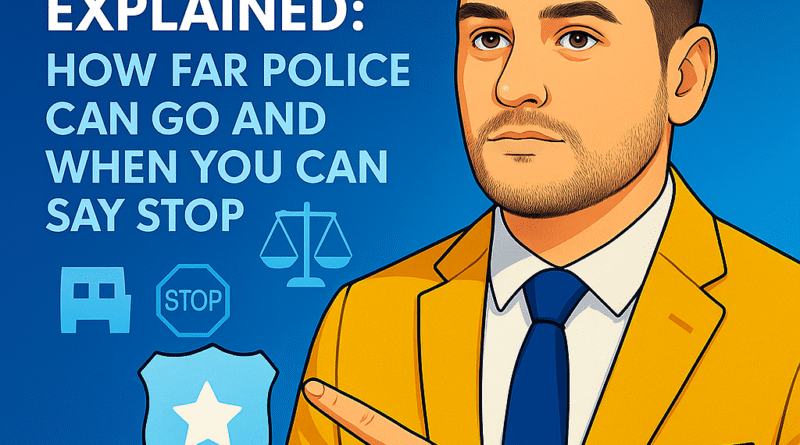Consent Searches Explained: How Far Police Can Go and When You Can Say Stop
Context: Police in the U.S. do not always need a warrant to search. One of the most common exceptions is a consent search — the officer asks, the person says “yes,” and the search becomes lawful. But consent is only as big as what the person allowed, and it can be limited or withdrawn at any time.
The U.S. Supreme Court has made it clear: when a person voluntarily consents to a search, the police do not need a warrant or probable cause. This rule, first articulated in cases like Schneckloth v. Bustamonte (1973), is one of the most powerful tools officers have in traffic stops, sidewalk encounters, and home visits. But it is not unlimited. Consent has a scope (what areas, what objects, what purpose) and consent can be revoked or narrowed if the person clearly says so.
Consent search
Person says “yes” to officer’s request to look.
- No warrant needed
- No probable cause needed
- Must be voluntary
Scope rules
Search is only as broad as what a reasonable person would think was allowed.
- “Can I look in the car?” ≠ “Can I break open the dashboard.”
- Container consent may be separate
- Third-party consent differs
Withdrawal
Person can say “Stop searching” at any time.
- Must be clear
- Future searching becomes unlawful
- What’s already found stays found (usually)
How officers get consent: typical scenarios
| Scenario | Officer’s request | Scope implied |
|---|---|---|
| Traffic stop | “Mind if I take a quick look in your car?” | Passenger compartment, obvious containers |
| Street encounter | “Can I check your backpack?” | Backpack only |
| Home visit | “Can we come in and talk?” | Entry + living room, not bedrooms |
| Drug suspicion | “Can I look for drugs or weapons?” | Places where drugs/weapons could fit |
1. What is a consent search?
A consent search is a search the police do because you allowed it. It is one of the classic exceptions to the Fourth Amendment’s warrant requirement. The Supreme Court said in Schneckloth v. Bustamonte, 412 U.S. 218 (1973), that consent is valid if it is voluntary under the totality of the circumstances — the officer does not have to tell you that you may refuse.
Why is this powerful for police? Because many street or traffic encounters begin with only reasonable suspicion or even less. Without consent, the officer might not have enough to search. With consent, the officer can look in a car, bag, or house without a warrant or probable cause.
Voluntary vs. coerced
- Voluntary: calm tone, no threats, no guns pointed, person not handcuffed, person’s choice.
- Coerced: officer says “If you don’t let me, I’ll arrest you” (without legal basis); several officers surrounding; threats about children or immigration; prolonged detention to force consent.
- Court will look at: age, education, language, number of officers, whether the person was already detained, and how the question was asked.
Important: officers do not have to say “you can refuse.” It is good practice to say it, but the Constitution does not always require it.
2. Scope of consent: how far can police go?
Consent is not all-or-nothing. It has a scope. The Supreme Court in Florida v. Jimeno, 500 U.S. 248 (1991), said the key question is: what would a reasonable person understand from the officer’s request?
So if the officer says, “Can I search your car for drugs?”, a reasonable person would think the officer can look in places where drugs can be hidden — glove box, console, maybe bags. But that does not automatically mean the officer can rip open panels or break containers.
Examples of scope
- “Can I look in your car?” → passenger compartment, under seats, maybe trunk if car design suggests one space.
- “Can I look in this room?” → that room, not closed drawers in other rooms.
- “Can I check your bag?” → the bag, not your phone inside the bag (unless drugs could be there and you didn’t limit it).
- “Can I look for weapons?” → areas big enough to hide a weapon (drawers yes, tiny jewelry box no).
Officers should stay within the object and the place of consent. If they want to go further, they should ask again: “Can I also look in that box?”
3. Who can give consent?
Not everyone has the right to let police search everywhere. The law requires actual authority (you really live there / own it) or apparent authority (officers reasonably believed you had control).
Typical situations
- Shared home: one roommate can usually consent to common areas (kitchen, living room) but not to the private, closed bedroom of another roommate.
- Married couple: either spouse can consent to shared areas. But if one spouse is present and objects, officers generally cannot search (see Georgia v. Randolph, 547 U.S. 103 (2006)).
- Car with several passengers: the driver or person in control can consent to the vehicle. Passengers can refuse to consent to their own personal containers (purse, backpack) inside.
- Employer/employee: employers can consent to search areas they control (desk, company car), but not private lockers clearly assigned to employees.
4. Withdrawal of consent: how to stop the search
Consent is not permanent. The person who gave it can withdraw or narrow it at any time. Courts require that the withdrawal be clear and unambiguous — officers do not have to guess.
Clear withdrawal phrases
- “I want you to stop searching now.”
- “That’s enough.”
- “You can look in the car, but not in the trunk.”
- “I’m no longer giving you permission.”
Once consent is withdrawn, officers must stop, unless they now have independent probable cause to continue (for example, they already saw drugs in plain view or smelled narcotics). Everything done after a valid withdrawal, without another legal basis, can be suppressed.
What about what was already found before the withdrawal? That usually stays admissible — the withdrawal does not retroactively erase earlier, lawful discovery.
5. Limits, abuse risks, and best practices
Because officers hold more power in these encounters, consent searches can easily slide into coercion. That is why many departments teach officers to phrase the request clearly and to accept “no.” It is also why community advocates teach people to say, “I do not consent to any searches.”
Common problems in real cases:
- Officers keep searching after person says “that’s enough.”
- Officer asks to “come in and talk” and then opens drawers.
- Traffic stop: officer gets consent for car and then searches phone.
- One roommate says no, but officers search because other said yes.
Quick guide (English)
- • Police can ask to search even if they have no warrant.
- • You can say “No, I do not consent.”
- • If you say “Yes,” they can search only what a normal person would think you allowed.
- • You can limit it: “Only the car,” “only this bag,” “not my phone.”
- • You can withdraw: “Stop searching now.”
- • Stay calm, do not physically interfere, repeat your refusal.
- • Write down what was asked and what you said, right after.
Legal and technical base (English)
Fourth Amendment: protects against unreasonable searches and seizures; consent is one of the well-established exceptions.
Key cases:
- Schneckloth v. Bustamonte, 412 U.S. 218 (1973) – consent must be voluntary; no absolute requirement to tell person they can refuse.
- Florida v. Jimeno, 500 U.S. 248 (1991) – scope of consent is what a reasonable person would have understood.
- Georgia v. Randolph, 547 U.S. 103 (2006) – physically present co-occupant’s refusal beats the other’s consent.
- Illinois v. Rodriguez, 497 U.S. 177 (1990) – apparent authority is enough if officers reasonably believed person had control.
- United States v. Drayton, 536 U.S. 194 (2002) – police do not have to advise bus passengers of right to refuse.
Modern practice (2020s–2025): many federal circuits continue to stress that consent cannot be the product of an unlawfully prolonged traffic stop (Rodriguez rule). If the stop was already illegal when consent was obtained, the consent may be tainted.
FAQ (English)
1. Do I have to let police search if they ask nicely?
No. You can say, calmly, “I do not consent to any searches.” If they have a warrant or probable cause, they can search anyway. But your refusal will be important later.
2. Can police lie about having a warrant to get consent?
No. Consent obtained through false claim of authority (for example, “we have a warrant” when they don’t) is not voluntary. Courts often suppress what is found.
3. If I consent to search my car, can they also search my passengers?
Not automatically. Your consent covers the vehicle and areas you control. Passengers retain their personal privacy in their own bags.
4. Can I withdraw consent after officers found something?
Yes, you can stop further searching. But the item already found will usually stay as evidence, because it was found when consent was still valid.
5. What if I don’t speak English well?
Language barriers are a factor in deciding if consent was voluntary. If you could not understand the request, your lawyer can argue the consent was invalid.
6. Can my roommate let police into my bedroom?
Usually no, if the bedroom is clearly yours and closed. But if the officer reasonably believed the roommate had access, the search may still be upheld as “apparent authority.”
7. Does silence equal consent?
Generally no. Officers need clear verbal or non-verbal permission (like stepping aside and gesturing in). Silence plus intimidation looks like coercion, not consent.
8. Can police search my phone with consent to search my car?
Usually no. A phone holds far more private data. Officers should ask separately or get a warrant.
9. What if there are several officers and I was scared?
Fear, multiple officers, weapons displayed and late-night stops are all factors that can make consent seem involuntary. Courts examine the full picture.
10. How do I protect myself in the moment?
Say clearly: “I do not consent to a search.” Do not resist physically. Ask if you are free to leave. Memorize or record details. Talk to a lawyer.
Conclusion
Consent searches are legal shortcuts: they bypass the warrant, but only because a person agreed. That agreement has limits — what can be searched, where police can go, and how long they can look. And it can be taken back. Knowing how consent, scope and withdrawal work in practice helps citizens say “no” when they want to and helps officers document valid, defensible searches.
Do you have any questions about this topic?
Join our legal community. Post your question and get guidance from other members.
⚖️ ACCESS GLOBAL FORUM
